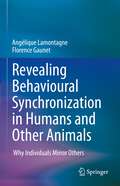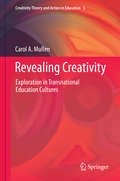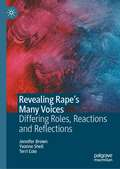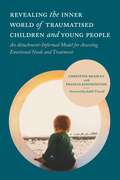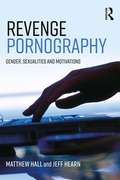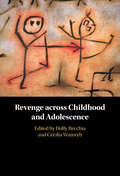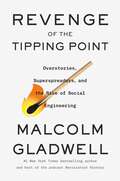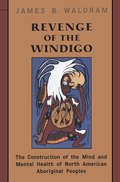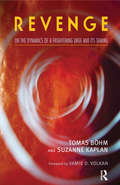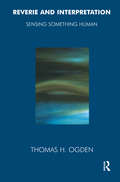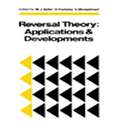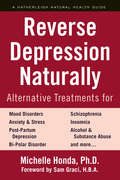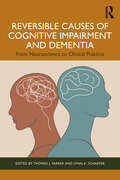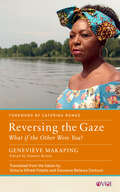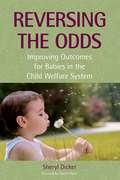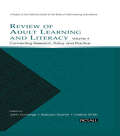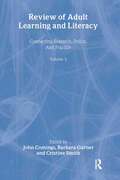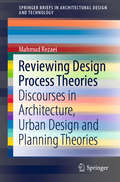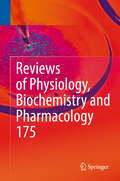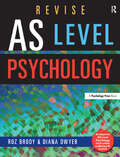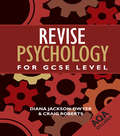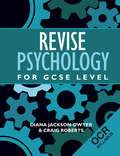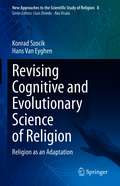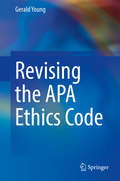- Table View
- List View
Revealing Behavioural Synchronization in Humans and Other Animals: Why Individuals Mirror Others
by Angélique Lamontagne Florence GaunetThis book presents a thorough and up-to-date review of the scientific literature on behavioural synchronization and its underlying neurocognitive and neurophysiological processes, from the neuronal to the interindividual and group scale. This multi-disciplinary and multi-scale approach makes this book of interest to scientists and graduate students for both theoretical issues as well practical issues such as mobilizing animals and humans for group / mass actions (e.g. for climate change, diabetes, leading animals, etc.).
Revealing Creativity: Exploration in Transnational Education Cultures (Creativity Theory and Action in Education #5)
by Carol A. MullenRevealing Creativity: Exploration in Transnational Education Cultures explores the recovery and fostering of creativity under educational constraint. This longitudinal global study of diverse education populations in China, Canada, and Australia offers application of the 4-C Creativity Model through experiential activities and exploratory interviews within classrooms and other learning spaces. Transnational in scope, this book describes an original innovative method, process, and tool for addressing obstacles to creativity in educational environments and within the self that constitute a significant challenge to practice. Through an immersive encounter with a validated creativity model, diverse cultural groups were guided to interpret the 4-C classification system and uncover their latent potential as creators. For their own purposes, readers can adapt the dynamic model-as-method process for releasing and revealing creativity within accountability-bound competitive cultures.
Revealing Rape’s Many Voices: Differing Roles, Reactions and Reflections
by Jennifer Brown Yvonne Shell Terri ColeBy extending the cast list of roles implicated in rape’s hidden sphere of harm, this book attentively listens to experiential voices of complainant/witnesses, suspect/accused, police, lawyers, judges and jurors, therapists, advocates, partners, parents, family and friends during the criminal justice journey. Highlighting good and bad practices, it proposes a paradigm shift for inculcating policy reform, arguing the case for implementation science as a framework for embedding change. The book will be of interest to those involved in the policy, practice and delivery of criminal justice, the support and voluntary sector as well as giving valuable insight to students of forensic and investigative psychology, criminology, law, social policy, gender studies the new policing apprenticeship degree programmes.
Revealing the Inner World of Traumatised Children and Young People: An Attachment-Informed Model for Assessing Emotional Needs and Treatment
by Jonathan Stanley Christine Bradley Francia Kinchington Judith Trowell Dr Alistair Cooper John Diamond John WhitwellBringing together the latest research and theory about a child's inner world and the impact of the world around them, this is a guide to understanding and responding to the emotional needs of traumatised children. Founded on the principle that traumatised children do not have a secure sense of self and therefore cannot relate to the outside world without becoming overwhelmed, this book brings psychoanalytic and psychodynamic understandings of child psychology together with current neuroscience and trauma theory. At the heart of the book is an attachment-informed assessment model and guidance for treatment. Professionals working therapeutically with traumatised children, including therapists, psychologists, psychiatrists, mental health workers, social workers and residential care workers, will benefit from the wealth of knowledge and valuable practice guidance presented in this book.
Revelations That Will Set You Free: The Biblical Roadmap for Spiritual and Psychological Growth
by Troy ReinerSalvation begins with faith but many Christians are frustrated trying to live the Christian life in this world. They want to serve Christ but find that they fail again and again in their attempts to get victory over sin, overcome the flesh, die to the self, and love others. Most have no definite idea of how these goals are to be achieved. This should not be the case because the Bible gives us a clear road map to spiritual and psychological maturity; it is accomplished revelation by revelation as we grow in our knowledge of God. It is not enough to have the knowledge of God in our minds or even to love Him with our emotions-faith must grow in our spirit. Only through this kind of faith is it possible to overcome our selfishness, develop the self-discipline necessary to conquer sin, and achieve a life of peace motivated by unconditional love. This book clearly and concretely explains each step in this process, identifies the spiritual revelations required, and provides methods and models for assisting us in moving to the next step. The goal of this book is to remove the mystery that shrouds the process of spiritual and psychological growth so that the path to spiritual maturity can be clearly seen and followed.
Revenge Pornography: Gender, Sexuality and Motivations
by Matthew Hall Jeff HearnFacilitated by developments in technologies, the non-consensual posting of sexually explicit images of someone else for revenge, entertainment or political motive – so-called revenge porn – has become a global phenomenon. This groundbreaking book argues that fundamental and recurring issues about how victims are violated can be understood in terms of gender and sexual dynamics and constructions, binary gender and sexual positioning and logics, and the use of sexual meanings. Using a discourse analytical approach the authors examine revenge pornography through the words of the perpetrators themselves and study the complex ways in which they invoke, and deploy, gender- and sexuality-based discourses to blame the victim. They explore strategies to curb the phenomenon of revenge porn, and by placing their research in a broader social and political context, the authors are able to examine the effectiveness of current legislative frameworks, education and awareness raising, victim support and perpetrator re-education programmes, along with wider political considerations. This enhanced understanding of the perpetrator mindset provides important insights into the use of social media to facilitate gender violence, and holds the promise of more effective interventions in future. This is a unique resource for students, academics, researchers, and professionals interested in revenge pornography and related issues.
Revenge across Childhood and Adolescence
by Cecilia Wainryb Holly RecchiaThis volume brings together research on revenge across childhood and adolescence to explore how revenge is a part of normative development, but also arises from maladaptive social environments. The chapters demonstrate the ways in which revenge is intertwined with social, emotional, cognitive, and moral development as well as being informed by interpersonal experiences within familial, educational, community, and cultural social settings. The book summarizes international scholarship on revenge across early childhood to late adolescence from a wide variety of interdisciplinary perspectives to provide a comprehensive overview of the field. The authors address how individual differences in revenge emerge as an adaptation to the challenges faced when growing up in adverse social and societal conditions. They then suggest a range of avenues for effective intervention that take account of the complexity of revenge as a psychological and social phenomenon.
Revenge of the Tipping Point: Overstories, Superspreaders, and the Rise of Social Engineering
by Malcolm GladwellTwenty-five years after the publication of his groundbreaking first book, Malcolm Gladwell returns with &“curiosity and humor&” in this New York Times bestseller that reframes the lessons of The Tipping Point in a startling and revealing light (Shannon Carlin). Why is Miami…Miami? What does the heartbreaking fate of the cheetah tell us about the way we raise our children? Why do Ivy League schools care so much about sports? What is the Magic Third, and what does it mean for racial harmony? In this provocative new work, Malcolm Gladwell returns for the first time in twenty-five years to the subject of social epidemics and tipping points, this time with the aim of explaining the dark side of contagious phenomena. Through a series of riveting stories, Gladwell traces the rise of a new and troubling form of social engineering. He takes us to the streets of Los Angeles to meet the world&’s most successful bank robbers, rediscovers a forgotten television show from the 1970s that changed the world, visits the site of a historic experiment on a tiny cul-de-sac in northern California, and offers an alternate history of two of the biggest epidemics of our day: COVID and the opioid crisis. Revenge of the Tipping Point is Gladwell&’s most personal book yet. With his characteristic mix of storytelling and social science, he offers a guide to making sense of the contagions of modern world. It&’s time we took tipping points seriously. Most Anticipated in:AARP| Associated Press| Time Magazine | Oprah Daily | Chicago Tribune | Literary Hub | Publishers Weekly | Publishers Lunch
Revenge of the Windigo
by James WaldramWhat is known about Aboriginal mental health and mental illness, and on what basis is this 'knowing' assumed? This question, while appearing simple, leads to a tangled web of theory, method, and data rife with conceptual problems, shaky assumptions, and inappropriate generalizations. It is also the central question of James Waldram's Revenge of the Windigo.This erudite and highly articulate work is about the knowledge of Aboriginal mental health: who generates it; how it is generated and communicated; and what has been ? and continues to be ? its implications for Aboriginal peoples. To better understand how this knowledge emerged, James Waldram undertakes an exhaustive examination of three disciplines ? anthropology, psychology, and psychiatry ? and reveals how together they have constructed a gravely distorted portrait of 'the Aboriginal.'Waldram continues this acute examination under two general themes. The first focuses on how culture as a concept has been theorized and operationalized in the study of Aboriginal mental health. The second seeks to elucidate the contribution that Aboriginal peoples have inadvertently made to theoretical and methodological developments in the three fields under discussion, primarily as subjects for research and sources of data. It is Waldram's assertion that, despite the enormous amount of research undertaken on Aboriginal peoples, researchers have mostly failed to comprehend the meaning of contemporary Aboriginality for mental health and illness, preferring instead the reflection of their own scientific lens as the only means to properly observe, measure, assess, and treat.Using interdisciplinary methods, the author critically assesses the enormous amount of information that has been generated on Aboriginal mental health, deconstructs it, and through this exercise, provides guidance for a new vein of research.
Revenge: On the Dynamics of a Frightening Urge and its Taming
by Tomas Bohm Suzanne KaplanThe revenge motif appears in a number of arenas and in different cultures. We need to be mindful of its existence in order to discover how common it is. We can then learn to recognize when destructive revenge spirals are developing. By extension, we thus gain a basis for stopping these spirals successfully before they have gone too far. We can also learn what function revenge plays and has played in various contexts. A short overview of revenge as a motif in literature, film, culture, religion, and at work is therefore given as an introduction to our study of revenge.
Reverie and Interpretation: Sensing Something Human
by Thomas OgdenThis book is concerned with an attempt to use language to capture/convey a sense of the delicate interplay of aliveness and deadness of human experience in the analytic setting represents a major challenge to contemporary psychoanalysis.
Reversal Theory: Applications and Development
by M. J. APTER, D. FONTANA and S. MURGATROYDFirst published in 1985. Routledge is an imprint of Taylor & Francis, an informa company.
Reverse Depression Naturally: Alternative Treatments for Mood Disorders, Anxiety and Stress
by Michelle HondaOffering breakthrough and effective holistic methods to manage and reduce depression and anxiety naturally from a leading naturopathic doctor.Globally, more than 300 million people of all ages suffer from depression and that number is only increasing. Reverse Depression Naturally provides a comprehensive overview of depression and anxiety and how to effectively and naturally manage them. It's a complete resource of healing remedies, dietary recommendations, mental exercises, and protocols. Reverse Depression Naturally offers practical tips and alternative solutions to popular treatments as well as beneficial supplements and home remedies. The book also features sections on stress, mental illness, alcoholism, and post-partum depression.
Reversible Causes of Cognitive Impairment and Dementia: From Neuroscience to Clinical Practice
by Thomas J. Farrer Lynn A. SchaeferThis pioneering book covers a broad range of reversible causes of cognitive decline and dementia, ranging from the basic neuroscience of the condition to clinical manifestations and practice treatment implications.It offers something new to the field of dementia assessment and treatment by shining a light on the multiple comorbidities that compound the patient’s clinical presentation and exacerbate cognitive decline and by presenting differential diagnoses and the imperative to rule out reversible causes of cognitive impairment/dementia in one key text. Taking a global approach, chapters include mild cognitive impairment and the impact of drugs and substance abuse and other medication effects. The book goes on to look at depression and other psychiatric presentations, chronic pain, metabolic conditions, and tumors and other space-occupying lesions. Infectious diseases and other medical illnesses that affect cognition are explored, along with the impact of sleep disorders and delirium. The book concludes with a focus on applications and treatment when maximizing an older person’s functioning and assessing their cognition and/or their capacity.It is essential reading for clinicians, researchers, and specialist nurses in aging and dementia as well as students of neuropsychology/neurocognition, medicine, and health and social work.
Reversing the Gaze: What if the Other Were You? (Other Voices of Italy)
by Geneviève MakapingTired of being scrutinized, criticized, and fetishized for her black skin, Cameroon-born scholar Geneviève Makaping turns the tables on Italy’s white majority, regarding them through the same unsparing gaze to which minorities have traditionally been subjected. As she candidly recounts her experiences—first across Africa and then as a migrant Black woman in Italy—Makaping describes acts of racist aggression that are wearying and degrading to encounter on a daily basis. She also offers her perspective on how various forms of inequality based on race, color, gender, and class feed off each other. Reversing the Gaze invites readers to confront the question of racism through the retelling of everyday occurrences that we might have experienced as victims, perpetrators, or witnesses.
Reversing the Odds: Improving Outcomes for Babies in the Child Welfare System
by Sheryl Dicker J. DBabies and young children in the child welfare system have a high prevalence for physical, cognitive, and social-emotional delays—and often don't have access to the services and supports that could make all the difference. This is the book that will help professionals go beyond abuse prevention and ensure comprehensive healthy development of these vulnerable children from birth to age 3. Demystifying the world of child welfare, this book shows early childhood practitioners how to successfully navigate this complex system and collaborate with a wide range of other professionals to meet young children's needs.
Review of Adult Learning and Literacy, Volume 4: Connecting Research, Policy, and Practice: A Project of the National Center for the Study of Adult Learning and Literacy
by Cristine Smith Barbara Garner John ComingsThe Review of Adult Learning and Literacy: Connecting Research Policy, and Practice, Volume 4 is the newest addition to a series of annual publications of the National Center for the Study of Adult Learning and Literacy (NCSALL) that address major issues, the latest research, and the best practices in the field of adult literacy and learning. Volume 4 opens with an overview of significant recent developments in the field. Subsequent chapters cover a wide range of topics critical to the success of adult education and literacy services in the United States: *issues of race, class, gender, and sexual orientation; *the role of workplace education in building adults' basic skills; *the role of new learning technologies in adult education and literacy; *adult developmental theories and their implications for the teaching of adult basic education and English for speakers of other languages; and *traditional and contemporary adult learning theories, including an annotated bibliography of key resources. Intended for policymakers, scholars, and practitioners dedicated to improving the quality of adult basic education, adult English for speakers of other languages, and adult secondary education programs, Review of Adult Learning and Literacy, Volume 4 is an essential resource for the field.
Review of Adult Learning and Literacy, Volume 5: Connecting Research, Policy, and Practice: A Project of the National Center for the Study of Adult Learning and Literacy
by Cristine Smith Barbara Garner John ComingsThe Review of Adult Learning and Literacy: Connecting Research, Policy, and Practice, Volume 5 is the newest volume in a series of annual publications of the National Center for the Study of Adult Learning and Literacy (NCSALL) that address major issues, the latest research, and the best practices in the field of adult literacy and learning.Each Review opens with an overview of significant recent developments in the field of adult literacy during the year, followed by a set of chapters presenting in-depth reviews of research and best practices on topics of high interest to the field. Volume 5 includes chapters on:*the increasing emphasis on scientifically based research and evidence-based practice in education, their use in adult literacy, and the perception of their usefulness by those who work in the field;*recent research on the impact of acquiring a General Educational Development (GED) credential;*the adult literacy system in the state of Massachusetts, focusing on the factors that led to investing and restructuring in the system, and the lessons learned that may be helpful to other states interested in building strong systems of educational service delivery for adult learners;*a history and review of volunteerism in adult literacy;*the history and structure of the adult literacy system in New Zealand, including policy recommendations for the current system to more effectively serve all adult learners; and*a review of theories and key resources related to metacognitive skills in reading.The Review of Adult Learning and Literacy serves as the journal of record for the field and is an essential resource for all stakeholders who need to know what research can reveal about how best to serve adult learners.
Reviewing Design Process Theories: Discourses in Architecture, Urban Design and Planning Theories (SpringerBriefs in Architectural Design and Technology)
by Mahmud RezaeiThis interdisciplinary book explores design theories, combining research from a range of fields including architecture, landscape architecture, urban planning, urban design, industrial design, software engineering, environmental psychology, geography, anthropology, and sociology. Following an extensive review of the current literature, the author reveals eight major types of theory in design processes. The theories are classified as follows: Rational vs. Empiricist Theories, Procedural vs. Substantive Theories, Normative vs. Positive Theories, Design Scopes, Designers vs. People, Form and Space Creation Paradigms, Efficient Tools and Sources in the Design Process, and Place vs. Non-Place Theories. The respective design theories are illustrated with diagrams, tables and figures, condensing the content of over 140 essential theoretical texts that address various aspects of design processes. Given its scope, the book will appeal to undergraduate and graduate students, and to researchers and practitioners in design, urban planning, urban design, architecture, art, etc.
Reviews of Physiology, Biochemistry and Pharmacology, Vol. 175 (Reviews of Physiology, Biochemistry and Pharmacology #175)
by Bernd Nilius Reinhard Jahn Roland Lill Thomas Gudermann Pieter De TombeLeading researchers are specially invited to provide a complete understanding of a key topic within the multidisciplinary fields of physiology, biochemistry and pharmacology. In a form immediately useful to scientists, this periodical aims to filter, highlight and review the latest developments in these rapidly advancing fields.
Revise AS Level Psychology
by Diana Dwyer Roz BrodyRevise AS Level Psychology is designed to give a clear framework of the content of the course. It will help both the hard-working student who has worked solidly throughout the course and the 'I should have worked harder' student who urgently needs to gain sufficient knowledge to pass the exam. It has been updated in line with the latest syllabus specification and includes page references to AS Level Psychology, 4th Edition by Michael W. Eysenck. Although it is designed to supplement this book, it can be used alongside any AS-level psychology textbook. This revision guide is written for a broad spectrum of students taking the AQA-A AS psychology exam. It gives excellent guidance, not only on how to pass the exam, but also on how to avoid the panic and pitfalls that so many students face at exam time. It includes a number of helpful features: An outline of the format of the exam, following the most up-to-date syllabus requirements, along with tips on how to perform well and advice on raising grades Essential topic information presented as flow charts and summary lists Clear and full definitions of important terms and concepts, studies, and theories An explanation of how examiners assess students Guidance throughout the text that encourages active engagement with the material Can be used with any AS-level psychology textbook, though there are cross-references throughout to the appropriate pages in Eysenck's AS Level Psychology
Revise Psychology for GCSE Level: AQA
by Craig Roberts Diana Jackson-DwyerThis is a comprehensive student revision guide for those taking the GCSE AQA Psychology exam. It summarises the specification material clearly and attractively, enabling students to easily digest and retain the information. Packed full of revision tips and techniques, the book includes a number of unique and helpful features: Overviews of the AQA specification content Summaries of the major research studies Practical and innovative suggestions for revision techniques at the end of each chapter Example exam questions and model answers A separate chapter dedicated to preparing for the exam, giving practical advice on getting organised, techniques for maximising revision time, and advice on structuring exam time appropriately for optimum performance A comprehensive glossary of important terms and their definitions, to aid understanding of the material. Revise Psychology for GCSE Level gives excellent guidance, not only on how to pass the exam, but also on how to avoid the panic and pitfalls that so many students face at exam time. Although a companion to the bestselling Psychology for GCSE Level, 2nd edition by Dwyer and Roberts, this revision guide can be used alongside any GCSE psychology textbook.
Revise Psychology for GCSE Level: OCR
by Craig Roberts Diana Jackson-DwyerThis is a comprehensive student revision guide for those taking the GCSE OCR Psychology exam. It summarises the specification material clearly and attractively, enabling students to easily digest and retain the information. Packed full of revision tips and techniques, the book includes a number of unique and helpful features: Overviews of the OCR specification content Summaries of the major research studies Practical and innovative suggestions for revision techniques at the end of each chapter Example exam questions and model answers A separate chapter dedicated to preparing for the exam, giving practical advice on getting organised, techniques for maximising revision time, and advice on structuring exam time appropriately for optimum performance A comprehensive glossary of important terms and their definitions, to aid understanding of the material. Revise Psychology for GCSE Level gives excellent guidance, not only on how to pass the exam, but also on how to avoid the panic and pitfalls that so many students face at exam time. Although a companion to the bestselling Psychology for GCSE Level, 2nd edition by Dwyer and Roberts, this revision guide can be used alongside any GCSE psychology textbook.
Revising Cognitive and Evolutionary Science of Religion: Religion as an Adaptation (New Approaches to the Scientific Study of Religion #8)
by Konrad Szocik Hans Van EyghenThis unique and pioneering book critically appraises current work from both the cognitive science of religion and the evolutionary study of religion. It addresses the question: Why does the believer possess supernatural or religious beliefs in the combined context of his cognitive biases, their adaptive usefulness measured in terms of survival and reproduction, and the impact of social learning and cultural traits? The authors outlines a pluralistic approach to the study of religion that does not treat religion as an accidental by-product but an adaptation selected by natural selection. Chapters discuss the role of religious components for the evolution of cooperation and altruism, and explore the development of atheism and secular ideas, in cognitive and evolutionary terms. Topics such as the usefulness of religion, the transmission of religious beliefs, and a Darwinian approach to religion are among those addressed. Contrary to standard views, religious biases are regarded as shaped by cultural influences and not merely by natural dispositions. This monograph will particularly appeal to researchers who are looking for a scientific explanation of religion and religious beliefs but who do not stop at the level of narrow cognitive and evolutionary accounts. The work will also be of interest to students of philosophy, sociology, religious studies, theology, or anthropology who seek to explain such fascinating, complex, and unequivocal phenomena as religion and religious components.
Revising the APA Ethics Code
by Gerald YoungThis integrative volume proposes major revisions to the APA ethics code and works toward creating an ethics code applicable across psychology, psychiatry, and related mental health professions. Careful analysis identifies theoretical and structural deficits in the principles and standards comprising the existing APA code, corrects its ambiguities, and provides scientific and compare-contrast illustrations to address current and potential controversies arising from current gray areas. Proposed revisions are informed by the American Medical Association, Canadian Psychological Association, and international ethics codes, emphasizing not only clearer language and diverse situations but also deeper conceptualizations of professional skills such as decision-making and client engagement. Ideally, the resulting universal code would be more inclusive of evolving ethical challenges in increasingly complex work environments and society. Included in the coverage: Comparison of the APA and CPA ethics codes. Proposing five core and five supplementary ethical principles and their sub-principles. Analyzing the APA's ethical standards toward revising the APA ethics code. Elucidating new standards, domains, sub-domains, and meta-principles. Culling lessons from the 2017 AMA medical ethics code. Examining ethical decision-making: fallacies/biases and models. Proposing new concepts, such as participatory ethics and psychological co-regulation. Giving concrete and practical recommendations toward revising the APA ethics code and creating a universal mental health ethics code. An exhaustive text that spans clinical, research, teaching, and education domains, Revising the APA Ethics Code is essential reading for ethics scholars, practitioners, and the APA administrative and ethics committee hierarchies. These real-world guidelines will help ensure that the mental health professions remain both modern and moral.
